Hello!
Did you know that 92% of consumers have more trust in influencers than in celebrities?
That fact, paired with the increasing use of adblock has resulted in more brands turning to influencers to market their products and services.
In this article, I will take you through the step-by-step process of leveraging influencer marketing for your ecommerce brand.
#1 Conduct Audience Research
If you want to be inspired by the best influencer marketing examples to run your own campaign, you need to know your target audience very well. Do not assume anything. Conduct your audience research religiously. Know who your actual target is. You may have different audiences if you sell different non-related products in your online shop.
 Segment them based on geographic, demographic, psychographic, and behavioral criteria. If your ecommerce business targets different age groups and both male and female audiences, you may have to look for more than one influencer.
Segment them based on geographic, demographic, psychographic, and behavioral criteria. If your ecommerce business targets different age groups and both male and female audiences, you may have to look for more than one influencer.
Conduct surveys to gather as much data as possible. It’s very important to know your target customers in and out before choosing an influencer. Collect information like what triggers the buying process, their behavioral patterns, what social media platforms they use, etc.
This will help you not only select influencers but also find the right social media channels for your campaigns. You should also map the buying patterns of your existing customers.
#2 Identify Your Channel(s)
Now that you have done your audience research, you need to find out which channel(s) are best to promote your brand. You need to figure out which platforms your target audience visits the most. Also, determine the purpose of your promotion. It could be awareness, sales, or something else.
Each social media channel has its own characteristics and audience. For example, 78% of 18 to 24-year-olds use Snapchat. But only 45% of this age group use Twitter and 71% use Instagram.
If your target audience is predominantly women, then Pinterest may be the best platform for your campaign because 41% of women use it.
On the other hand, YouTube is ideal for millennials. For other groups, Instagram Stories may be best for your campaign because they have a mind-boggling 100 million daily active users.
Analyze the available numbers and your criteria to determine which social media platform(s) to use for your campaign.
#3 Find Influencers
Next, you need to pinpoint your influencers based on your criteria. 75% of marketers and brands believe that selecting the right influencers is the biggest challenge they face.
You may be surprised by the idea that you should start your search in your own CRM. Your customers can be your best marketers.
 Explore your customer base to see if there are any influencers who match your criteria. Maybe somebody is already talking about your brand on different platforms, and you haven’t noticed them yet. Keep an eye on your social followers too.
Explore your customer base to see if there are any influencers who match your criteria. Maybe somebody is already talking about your brand on different platforms, and you haven’t noticed them yet. Keep an eye on your social followers too.
You can nurture those relationships with people who are already loyal to your brand. Look at their social profiles to discover whether or not they have a large or engaged following.
If they do, reach out to them for collaborations.
Many brands work with 5-10 influencers for each of their campaigns. However, it totally depends on your campaign goal, audience, and marketing strategy.
#4 Research Influencers
Once you have located potential influencers, research them to find out more about their industries, audience demographics, locations, etc. Contact them personally to learn more about them and their reach.
Analyze their content carefully. See if they have the right mix of sponsored and general content. There are many influencers who only post sponsored content. You should avoid them if possible.
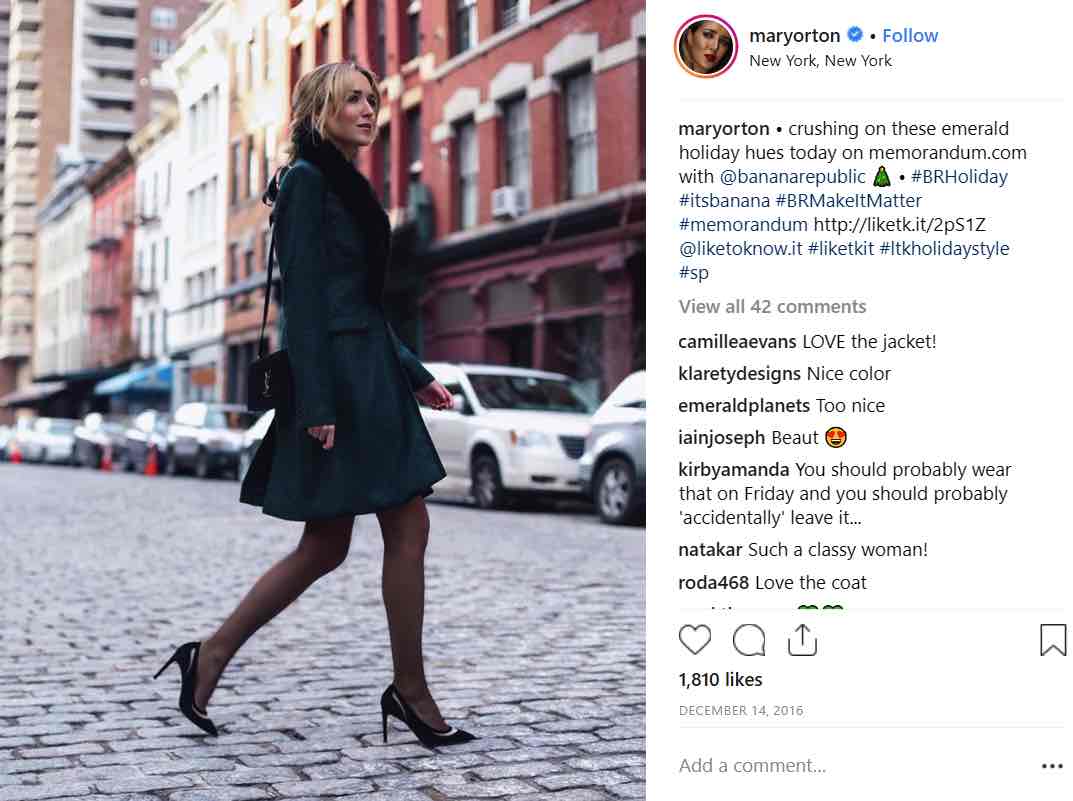 You may be tempted to look for influencers who have a huge follower base. But you should also check their engagement rates. You may find that micro-influencers (who typically have higher engagement rates) could drive better results. Also, they will cost you much less.
You may be tempted to look for influencers who have a huge follower base. But you should also check their engagement rates. You may find that micro-influencers (who typically have higher engagement rates) could drive better results. Also, they will cost you much less.
Banana Republic worked with Instagram micro-influencers who took pictures wearing clothes from the brand in different settings. This helped the brand reach a large targeted audience.
You should go through their social feeds to ensure that they post a healthy mix of sponsored and authentic content. If an influencer only publishes salesy content, you should find someone else.
#5 Build Rapport
Don’t rush into the process of finding suitable influencers because it’s not a one-time task. You may discover new influencers along the way.
Remember, even if you offer attractive compensation, an influencer might not agree to work with you if they perceive your brand negatively. So you need to first convey the value your brand can provide, and tell them how you can help them grow.
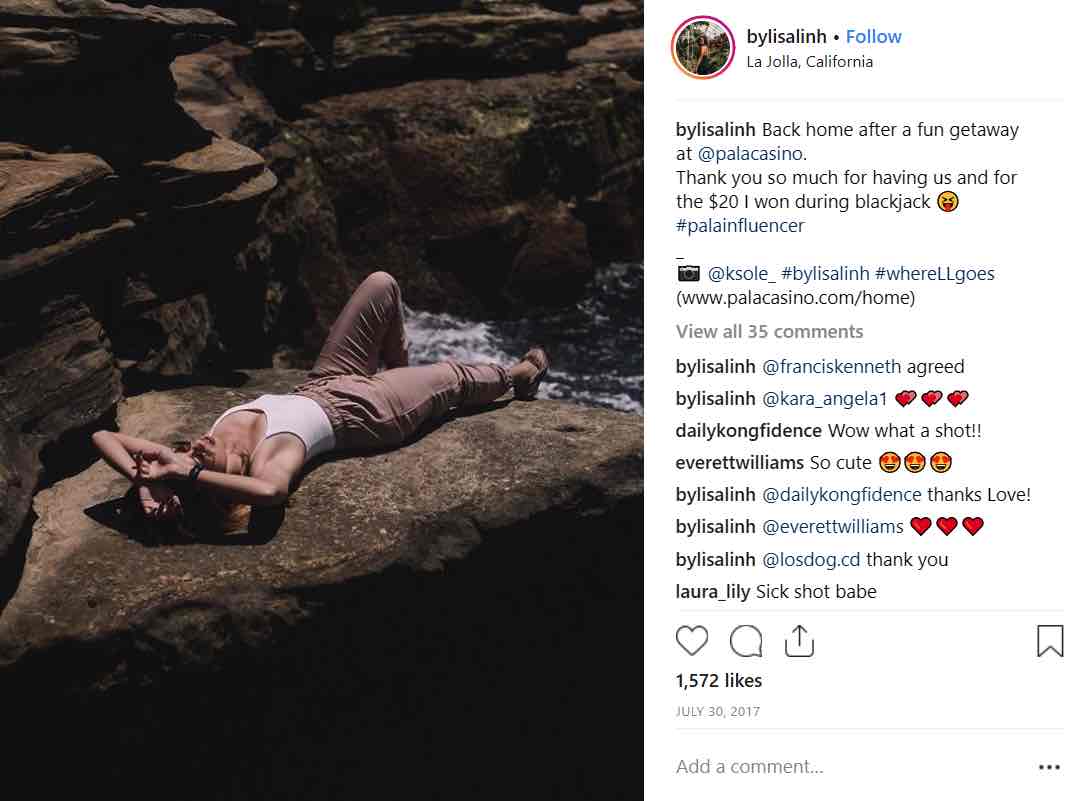 Build relationships with your influencers. You should connect with them as a person first, then as a brand.
Build relationships with your influencers. You should connect with them as a person first, then as a brand.
Engage with their content and promote them in your circles.
If they love your brand, influencers can make a huge difference to your campaigns.
You can also offer free products, experiences, or commissions for any sales driven by them.
Only offering free products might not work with most influencers. It takes them a lot of time and effort to create high-quality content, and build a loyal and engaged following. You need to offer them fair monetary compensation too.
Pala Resort and Spa invited 21 influencers to an event at their resort and asked them to create a minimum of three pieces of content to promote the resort. These 21 influencers had a combined reach of more than 28 million.
They created 87 pieces of content that resulted in 50,000 engagements. Here is an example of a post from this campaign.
#6 Budgeting
It's important to have a budget in mind before you start your campaign. You can use tools like the Instagram Money Calculator to estimate how much you might need to pay an influencer.
If you’re new to influencer marketing, you can allocate a test budget to begin with. In fact, 36% of marketers devote test budgets of less than $5,000 to influencer marketing.
You should choose a payment model that fits your budget as well as your relationship with an influencer. If you’ve seen good results working with them, you can offer a lump sum as compensation for the entire campaign. For a promising, budding influencer, you can use a pay-per-post model.
#7 Co-Create Great Content
Share your objectives, but allow your influencers to get creative with their content creation because they know their audiences better than you do.
It’s alright to provide them with a few talking points and guidelines, but make sure that influencers have ample room for creativity.
ModCloth does this very efficiently. They let their influencers showcase their own styles using ModCloth’s products and allow them to share their feelings about these products.
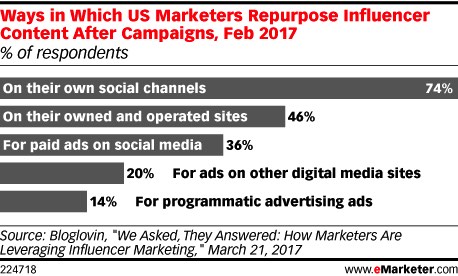 Marketers spend anywhere between $5,000 to $100,000 on a single influencer marketing campaign. There’s no reason why you shouldn’t repurpose some of that content for other campaigns. Influencer-generated content can be reused as ads, social media posts, or even as social proof on your website.
Marketers spend anywhere between $5,000 to $100,000 on a single influencer marketing campaign. There’s no reason why you shouldn’t repurpose some of that content for other campaigns. Influencer-generated content can be reused as ads, social media posts, or even as social proof on your website.
Here’s how marketers use influencer-generated content once their campaigns are over:
#8 Track and Measure
Measurement and big data analysis are crucial to calculate the ROI from your influencer marketing campaigns. It also helps to make any necessary adjustments to your current as well as future campaigns.
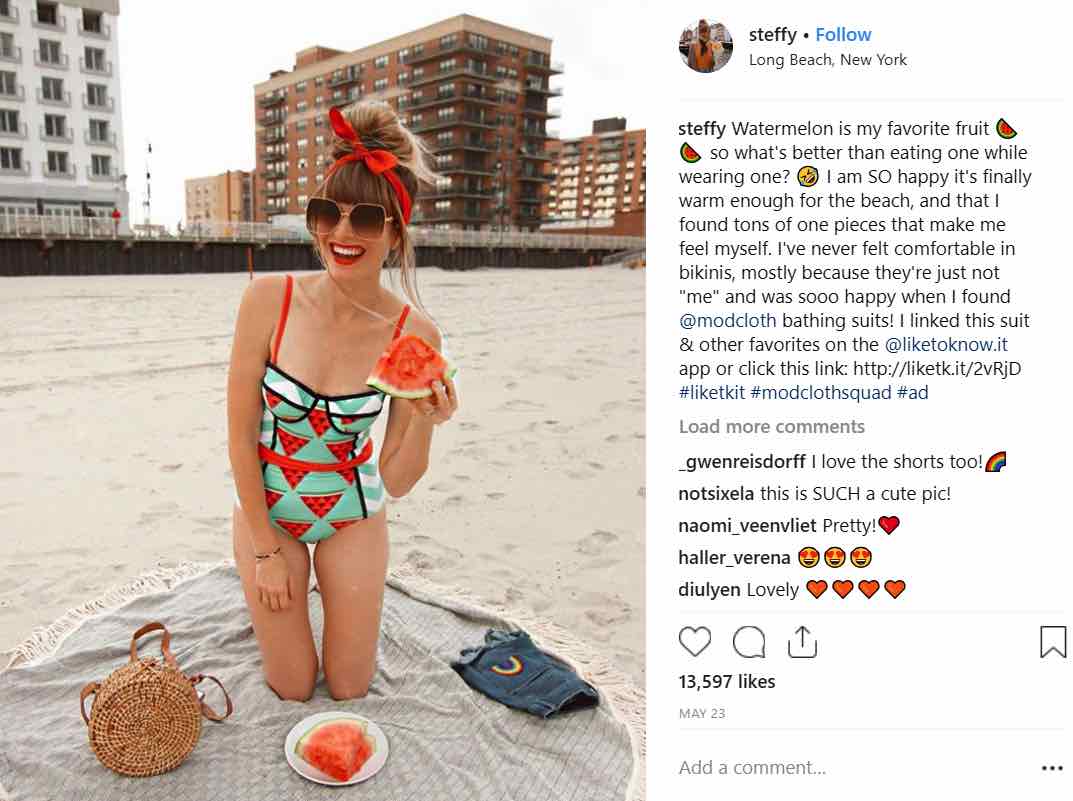 So you must analyze the performance of your posts as well as that of each influencer in your campaign.
So you must analyze the performance of your posts as well as that of each influencer in your campaign.
A large number of influencer posts for Daniel Wellington, a reputable watch brand, include discount codes. The brand uses these codes to not only drive sales but to identify their top-performing influencers.
Depending on the goals you had selected when you started the campaign, track your results. You might want to measure referral traffic, engagement, follower growth, or even sales.
To make things easier, you can use influencer management tools such as Grin to track the performance of your campaign. You get access to an aggregated feed of content posted by all of your influencers in one place. So you can analyze and figure out who your top-performing influencers are.
A Few More Rules to Keep in Mind
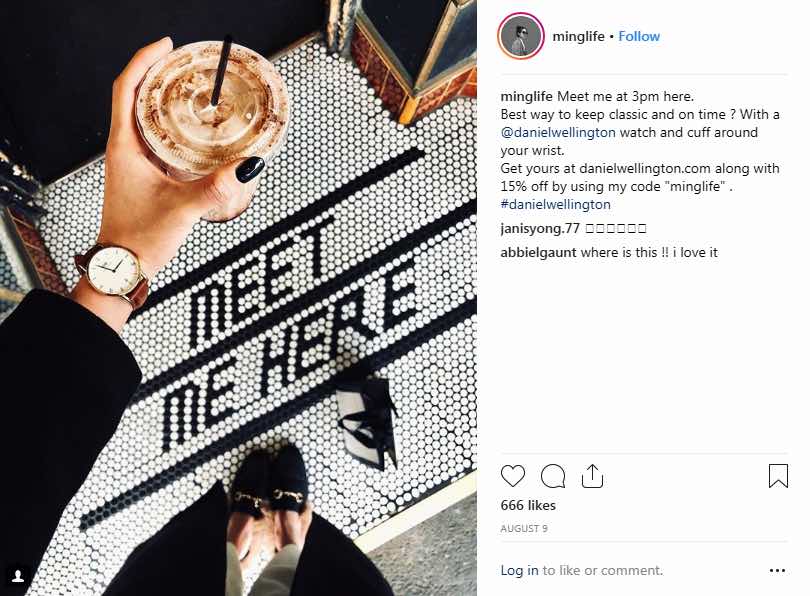 ● When crafting your influencer marketing strategy, don’t depend entirely on influencers to generate quality images and videos. You can help them by providing high-quality images of your products that they can use in their content.
● When crafting your influencer marketing strategy, don’t depend entirely on influencers to generate quality images and videos. You can help them by providing high-quality images of your products that they can use in their content.
● Instagram Stories are one of the most popular content formats right now. So make sure that you ask influencers to create some Stories as part of your campaign too.
● When you evaluate influencers, don’t just look at their follower counts because followers can be acquired by unscrupulous means too. Instead, pay more attention to the engagement they get on their posts. Engagement is a better test of influence.
● Building long-term relationships with influencers is still the key to successful influencer marketing and maximizing your ROI.
Final Thoughts on How to Do Influencer Marketing for Ecommerce Successfully
How to do influencer marketing the right way is one of those (good) problems every successful e-commerce business has. In this article, you saw some of the most crucial rules for ecommerce influencer marketing. Spend a good amount of time on research because you can’t afford to select influencers based on your assumptions. Instagram is a great social media channel to start with to generate leads with influencer marketingbut this isn't the only one, though.
Also, focus on building long-term relationships with your influencers. Provide them with creative freedom and co-create content with the help of your influencers for your campaigns. Finally, don't forget to analyze the results of your campaigns. Not only an influencer marketing strategy will help you reach a new audience, it will also help you build trust and credibility and it will help you convert one-time shoppers into loyal customers
Do you have any other tips on effective ecommerce influencer marketing? Please share them in the comments below.
Thank you!
Subscribe to our newsletter! Join us on social networks!
See you






